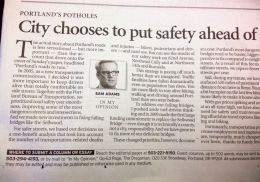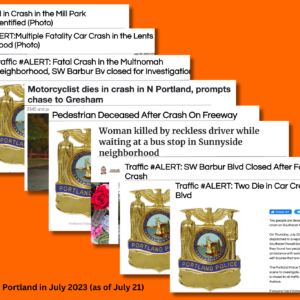
Lest you think my repeated criticisms of the way The Oregonian frames transportation issues was just my personal axe to grind, it’s worth noting that the front page story in their Sunday edition is being called out from many corners.
In addition to the numerous intelligent citizens we’ve heard from in the comments, now Mayor Sam Adams, the Bicycle Transportation Alliance (BTA), and even The Portland Mercury have issued detailed rebuttals to the now infamous, “Portland’s Roads to Ruin” story by The Oregonian’s Beth Slovic.
“I understand bicyclists’ defensiveness about anything that seems anti-bike… Still, should the city be sponsoring bike rides and transit conferences when major streets are in danger of failing… ?”
— Michelle Brence, Slovic’s editor
Mayor Adams has come out full force to defend his record and share his pointed criticism of the article. In a guest op-ed in The Oregonian today titled, Portland’s potholes: City chooses to put safety ahead of smoothness, Adams does not hold back. After detailing his decisions to invest in a safer system, not just a smoother system, he writes:
“Unfortunately, a debate about the relative merits of safety, comfort and accessibility isn’t terribly sensational, so The Oregonian turned the story into something else. The newspaper’s 2,400-word account didn’t mention the word “safety” even once, even though I talked about it nearly two dozen times in my interview.
It’s unfortunate the newspaper squandered an opportunity to tell its readers the true story about the city’s transportation priorities.”
In addition to that op-ed, Adams has posted background info and a Q & A about PBOT funding on his website. To back up his account of the interview, Adams has even posted the full audio recording of his discussion with Slovic.
In a blog post published this morning, The BTA’s leader Rob Sadowsky said The Oregonian article was “simply misleading.” Here’s another snip from Sadowsky’s response:
“An article that truly sought to inform readers, rather than whip up readers’ anger at a perceived runaway government, would have gone through the $222 million budget and actually explained where the money goes.”
The Portland Mercury also chimed in to refute The Oregonian’s piece. Reporter Sarah Mirk says, “The story hits home some good points, but in my opinion, its framing is misleading.” Here’s why she feels that way:
“From a cuts perspective, I’d argue that street repaving and bike projects were actually cut equally, not with bikes as the vampiric top priority. PBOT’s proposed budget calls for cutting $1 million from street preservation, which means the city will only repave 15-20 miles of streets, instead of 40 miles. But the street repaving budget is $9.5 million, so slicing $1 million is a 10 percent cut. PBOT also plans to cut 10 percent of the $1 million neighborhood greenway budget, which is the cash used to make streets like NE Going and SE Spokane better for bikes.”
For their part, The Oregonian defends the article. On Twitter yesterday, Publisher Peter Bhatia referred to it as “Excellent watchdog reporting.” Michelle Brence, Slovic’s editor on the story, even left a comment on BikePortland to stick up for it. Unfortunately, her defense only seemed to make matters worse (at least judging by folks who replied to her comment).
“I understand bicyclists’ defensiveness about anything that seems anti-bike,” Brence wrote, “I’m a bike commuter myself…” Then Brence argued that, “Spending on bike amenities is one tiny reason, and nowhere near the biggest reason.” After that comment, she doubled down on the article’s central — and quite misleading — premise:
“Still, should the city be sponsoring bike rides and transit conferences when major streets are in danger of failing, potentially costing taxpayers (including us bicyclists) millions and millions of dollars down the road?”
For those of you that think we are making too much out of this one article, it’s important to remember that this type of reporting about bicycles is a pattern at The Oregonian that has been going on for many years. Will this current boatload of criticism impact their future work? That’s hard to say. Will they acknowledge their mistake this time? Maybe…
In 2008, an associate editor at the paper, Rick Attig, heard our criticisms and admitted they sensationalized stories at the expense of bicycling. After running several days of above-the-fold stories about road rage incidents involving bicycles, Attig published a mea culpa stating, “Maybe we overplayed this story, but it was compelling to readers…”
Hopefully The Oregonian will realize that their continued sensationalism around bicycling is now compelling many readers to simply ignore them.







Thanks for reading.
BikePortland has served this community with independent community journalism since 2005. We rely on subscriptions from readers like you to survive. Your financial support is vital in keeping this valuable resource alive and well.
Please subscribe today to strengthen and expand our work.
Interestingly enough I had the chance to listen to Earl Blumenauer Saturday morning: He broke down transportation costs to taxes dollars paid in/tax dollar paid out for transportation. We bike-riding city-dwellers did quite poorly as you might imagine: We receive less than a dollar for each dollar that we pay in… Suburbanites did much better! I feel tempted to slide into a rant now, but will resist.
“Hopefully The Oregonian will realize that their continued sensationalism around bicycling is now compelling many reader to simply ignore them.”
Or in my case, more than just ignoring them I am trying to cancel my subscription with them. Unfortunately their phone lines aren’t accepting any calls so far today……
Ha! One of my co-workers is also attempting to cancel today, although more due to the doubling of subscription costs over the last year than the third-rate journalism.
Sara Mirk is hardly an objective third party. She just shills for her friend Amy Ruiz on Adams’ behalf. So you basically are listing two Adams supporters and Adams himself as rebuttal for Slovic’s article. Pretty flimsy.
The O is not being objective in any way shape or form. the only thing that’s flimsy is there reporting
Focus not on who I’m listing, but what those people are saying about the article. You can get caught up in personalities if you want, but just look at the data and the facts behind this. The facts tell a much different picture than The O article and that’s the chief criticism.
Considering the source of information is not “getting caught up in personalities” it is being a discerning reader. Do you consider Fox News a good source on information? How about a study on Global Warming produced by Exxon?
The people who’s responses you listed have a stake in Sam Adams administration. Their work cannot be trusted on it’s face.
I agree considering sources isn’t just about personalities. My point is that, while yes, these people are not objective third parties, the numbers and underlying policies they are using to make their arguments are the correct ones.
In the same way you accuse Sarah Mirk of being biased for Adams I could accuse Slovic of being biased against Adams. What’s the difference?
And no, I don’t consider Fox News a good source of information because they are a political organization disguised as a news source.
Why don’t you point out what parts of the information that they have presented that you believe to be untrue? Make a case against what they are saying if you want to be taken seriously.
As previous posters have pointed out, it wasn’t the story so much as the accompanying headlines which said the roads aren’t t being repaved because PBOT spends the money on bike lanes. That headline was highly misleading as many have pointed out, bike projects are a tiny fraction of PBOT’s overall budget, and highly inflammatory. To see that the editors at the O suceeded in creating more controversey and divisivness over cycling one need only read the comment section appended to the story.
It’s been 20 years since I worked in a newsroom, but I was a newspaper reporter for seven years and won several state awards in Pennsylvania for investigative reporting and feature writing. Beth Slovic does not bear the bulk of the blame for how the story was played, the Oregonian’s newsroom management does. Editors, not reporters, write headlines. In this case, where you have screaming headlines of the size previously reserved for events like the bombing of Pearl Harbor, 9/11, or the Kennedy assassination, every editor in the hierarchy up to the Executive Editor had to sign off. They know that bicycling is a hot button issue for a certain segment of the community and they consciously mislead their readers so they could push it.
I know the Oregonian like many dailies is in a desperate battle for survival, but It leaves me disgusted and demoralized that the paper of record for our state would stoop to such a level in pursuit of a few more web hits and newstand sales.
In a word, people are not overreacting.
If we’re talking headlines, maybe you’ll comment on Maus’s inflammatory blog headline yesterday that completely mischaracterized the O’s article?
Sorry Jon. It wasn’t a mischaracterization.
I hope my lengthy response to your comment comes out of moderation.
I disagree with your characterization. Maus’ headline referred to the “Oregonian” not to an “Oregonian” story. As I discussed above, it was the headlines published by the Oregonian that said streets aren’t being repaved because the money is being spent on bicycles. That’s what Maus said the Oregonian did, and he is correct.
You seem like you have some sort of agenda against Sam Adams. It really has no place in this discussion. I’m not sure why you are commenting at all, as your comments do nothing to address the content of this Oregonian article.
“Compelling” ??? and when It incites a driver to buzz or otherwise menace a cyclist, I would be compelled to include the Oregonian as a contributing factor to the crime.
Welcome the second golden age of yellow journalism folks. How ironic is it a “blog” does a better job of providing accurate information and makes a more concerted effort to achieve accuracy than a “major urban newspaper.” Oh sure sometimes we can all use some spell check. The content on bikeportland is consistently comprehensive and for the most part, when labeled as “news” and not an editorial, impartial.
Not sure why those writers get so offended with J-Maus over this issue. He’s right. They’re tools and they know it. But it’s a job and it pays and you get to write, you know?
What the Oregonian failed to point out was what the true tradeoffs are: Would you rather have potholes in the street or dead people?
Sarah Mirk’s piece in the Mercury has exactly what I thought was missing from the Oregonian piece: comparisons between numbers, and not just numbers thrown out in isolation.
It even includes the street paving budget, $9.5 million. Which is a number that seemed conspicuously absent from the Oregonian article which 1) argued that street paving is a vital but neglected service, and 2) included numbers for everything from the value of the entire Portland street system to the cost of the city’s contribution to the Railvolution conference, to Tom Miller’s salary.
Dude, it’s the *Oregonian.* You need a salt-lick sized grain of salt to read anything they print.
Not looking forward to another summer “bicyclists versus drivers” war exacerbated by the Oregonian.
Oh and the comment section of the Oregonian is where rational discourse goes to die. Don’t scroll below any article, it hurts your brain.
Here’s an interesting analysis of the recent loss of advertising revenue in the newspaper industry, which may explain the decline in quality at the Oregonian and the rise in hysterical, poorly written stories like the one under discussion here.
http://www.theatlantic.com/business/archive/2012/02/the-collapse-of-print-advertising-in-1-graph/253736/
I’m sorry, but its time to raise the gas tax. As a driver, I’m tired of paying so little on gas and having under funded Multi-Modal infrastructure.
Jonathan: I have to admit that I was a little disappointed when you signed on to become part of the Oregonian Network, or whatever it’s called. I understand about trying to “work from the inside”, and I can respect that. I do hope that you’ll re-evaluate your position in light of the recent events. After a certain point I think it will start to hurt your credibility, and I don’t want to see that happen.
Some say “Its just the headline, the story has more substance”. Problem is, the headline is important. For many, that’s all that is read, as one surfs through the paper, saying “damn bicyclists” as they move on to something else. Its inflammatory and sensationalism. I quit that paper when they indorsed George Bush for his first term. I have the Mercury, WW, and other foreign and domestic papers of much higher quality that the “Borogonian”.
Add to that the fact that, while the story does have more substance, it too pins the blame on bicycle funding in exactly the way the headline does. The story starts by saying poorly paved streets are the problem, and that paving is being underfunded. Then it says PBOT has other priorities, and first on the list is $900,000 for bike routes. It’s an expanded, more substantial version of the very same scapegoating seen in the headline.
And it’s worth noting once again that the things the article lists as “other priorities,” along with the bike funding total up to around $2 million dollars. Which sounds like a lot until it’s pointed out that that is less than 1% of the $222 million budget. Context does wonders.
The Oregonian could make amends by firing Slovic and reprimanding its editorial staff. I won’t hold my breath.
For doing the job exactly as the publisher wants? Wouldn’t surprise me at all if it came to light that the publisher manipulated the content of of this news article.